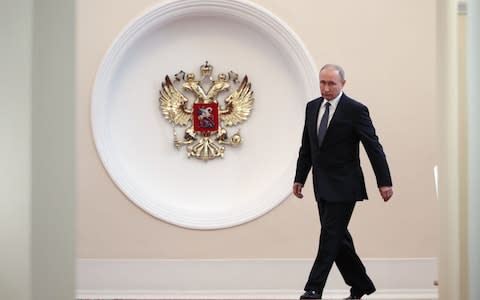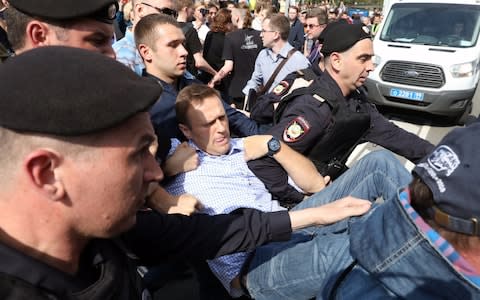Russia's Putin sworn in for another six years in office

President Vladimir Putin has been sworn in for another six years in a lavish Kremlin ceremony days after police detained hundreds at protests against his continued rule.
The 65-year-old Russian leader, who has been in power for 18 years, took the oath of office with his hand on a gold-embossed copy of the constitution in front of 5,000 guests in the Grand Kremlin Palace. After striding through the huge gilded doors of the hall to be sworn in, Mr Putin promised in a speech that “Russia will continue to strengthen its might, and people will live better”.
He echoed his call during the election for improved living standards and “economic and technological breakthroughs” while warning against social unrest.
“In more than a thousand years of history, Russia has suffered through epochs of troubles and trials and always was resurrected like a phoenix,” he said. “It achieved heights that were beyond the strength of others, that were thought to be unobtainable, but for our country became, to the contrary, a new springboard, a new historic frontier for a further, powerful leap forward.”

Mr Putin was re-elected in March with 77 per cent of the vote, giving him a clear mandate despite allegations of ballot-stuffing in some regions.
His most outspoken critic, opposition leader Alexei Navalny was barred from running over a politicised embezzlement conviction.
On Saturday, thousands demonstrated against the president's fourth term under the slogan “he's not our tsar”. Police detained Mr Navalny and some 1,600 other protesters, according to independent monitor OVD Info.

In a state of the nation speech before the election, Mr Putin called for economic growth and increased government spending but also announced hypersonic nuclear weapons to overcome US missile defence, continuing the belligerent rhetoric of recent years.
Although Russia's economy has emerged from a recession and is expected to grow 1.7 per cent this year, it has suffered volatile oil prices and Western sanctions, and 22 million are now living below the poverty line.
In one of his ambitious “May decrees,” which are only sometimes achieved, Mr Putin ordered the government on Monday to halve the poverty level and increase the average life expectancy from 72 to 78.
According to the constitution, he cannot run for president again, casting uncertainty over Russia's future after 2024.
After the inauguration, Mr Putin re-nominated Dmitry Medvedev, who kept the presidential seat warm for him in 2008-12, to continue his duties as prime minister. Mr Medvedev said he would shake up the cabinet, naming high-ranking officials from elsewhere as his deputies for the defence industry and sport.
Among the guests of honour at the Kremlin on Monday was American actor Steven Seagal, who received a Russian passport from Mr Putin in 2016, as well as Alexander “Surgeon” Zaldostanov, the leather-clad head of the patriotic Night Wolves biker gang.
Spotted next to Dmitry Medvedev at Putin's inauguration: former German Chancellor Gerhard Schroeder. pic.twitter.com/xjRNURKmQ6
— Lucian Kim (@Lucian_Kim) May 7, 2018
Former German chancellor Gerhard Schroder, who was appointed chairman of Russia's state oil giant Rosneft last year, stood next to Mr Medvedev and Russian Orthodox patriarch Kirill.
Current German leader Angela Merkel will meet with Mr Putin in Sochi later this month, a Kremlin aide said on Monday.
This week, Mr Putin will receive Israeli leader Benjamin Netanyahu, who is expected to push back against Russia's announcement it would deliver S-300 surface-to-air missiles to Syria following American, French and British airstrikes there.
Social media users poked fun at the pompous ceremony, especially when the head of the constitutional court appeared to mix up similar-sounding Russian words and declare Mr Putin's new term a “crime” rather than an “appointment”.
After the swearing in, Patriarch Kirill blessed Mr Putin in a Kremlin church and prayed for his “spiritual and physical strength to fulfil” the plans laid out in his speech.

